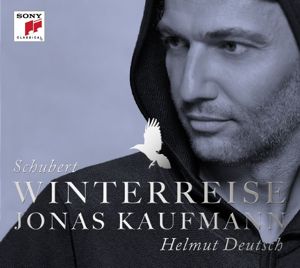|
|
|
|
|
|
|
|
|
Opera News, July 2014 |
| DAVID J. BAKER |
|
|
|
Jonas Kaufmann and Helmut Deutsch: "SCHUBERT: Winterreise" - Editor's Choice |
|
 This
is a gem of a performance, but one that bucks current trends. The bleak
nature of Schubert's Winterreise,with two-thirds of its songs in minor keys,
is often taken as an invitation to probe, analyze and even diagnose its
protagonist. In the final song, "Der Leiermann" (The Hurdy-gurdy Man), the
traveler, totally undone, will wind up identifying with the village idiot, a
fate treated so indelibly by Schubert that it colors the whole cycle.
Understandably, many singers are apt to seek clues to that decline earlier,
even in the very first songs, and to keep emphasizing eccentricity,
instability and other predictive symptoms. This
is a gem of a performance, but one that bucks current trends. The bleak
nature of Schubert's Winterreise,with two-thirds of its songs in minor keys,
is often taken as an invitation to probe, analyze and even diagnose its
protagonist. In the final song, "Der Leiermann" (The Hurdy-gurdy Man), the
traveler, totally undone, will wind up identifying with the village idiot, a
fate treated so indelibly by Schubert that it colors the whole cycle.
Understandably, many singers are apt to seek clues to that decline earlier,
even in the very first songs, and to keep emphasizing eccentricity,
instability and other predictive symptoms.
That is not Jonas
Kaufmann's approach. Here, each step downward feels like an unexpected blow.
His traveler resists, protests and struggles, at higher volume than many
others. The performance maintains an urgent pulse throughout, amid rich
rubato, with rock-solid support from veteran accompanist Helmut Deutsch. The
singer's unusual warmth maintains tension between past and present: his
timbre suggests a robust, somewhat naïve young man who's new to morbid
reflection.
Kaufmann's singing has beauty of line and tone, whether
at intimate mezza voce or full-blooded Wagnerian level. The tenor sounds
more secure and more flexible than in his 2010 recording of Die Schöne
Müllerin with Deutsch for Decca. Kaufmann manages to smooth his vocal
registers and misses not a note in the dizzying "Die Wetterfahne" or the
rushing descending lines in "Letzte Hoffnung." He keeps the texts prominent
and poetic, with some vivid word-painting ("wie weit noch bis zur Bahre!"),
while responding to the musical shape and diverse rhythms of the songs.
Yet, for all the sensitivity and variety he commands, Kaufmann sometimes
falls into rigid patterns. His treatment of dynamics favors doggedly
alternating extremes. In one place, that model is actually demanded by
Schubert; the composer's markings in the tenth song, "Rast," call for a
series of alternations between leise (soft) and stark (loud). These artists
proceed to apply that seesaw template a little indiscriminately elsewhere,
as if soft music always needed an immediate contrasting foil; Kaufmann also
likes to end loud. Even the eerie obsessive exercises, such as "Auf dem
Flusse," "Der greise Kopf" and "Die Krähe," after fine, minute treatment,
end in inappropriate explosions.
Nevertheless, the device has a
strategic narrative impact. Later in the performance, the contrasts subside,
and a quieter mode starts to prevail, signaling a critical turning point at
the seventeenth song, "Im Dorfe." Here, Kaufmann encompasses states —
exhaustion, isolation, rejection, bemusement, distance, pained resignation —
of such range and subtlety as to redeem anything that seemed too mechanical
before. In fact, his resistance has aptly prepared the way, serving to
dramatize this surrender to quiet, devastating insight.
But at the
end, in the tenor's chilling final song, a trace of the leise/stark habit
suddenly intrudes. Where most versions fade out mysteriously, his very last
notes trigger a quick vocal flare-up at a real forte. It's daring but
somehow not inappropriate to this traveler, whose vehement protests all have
the same futility.
|
|
|
|
|
|
|
|
|
|
|
|
|
|
|
|
|
|
|